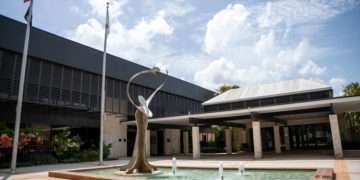Data from a digital funding platform shows that 2023 was an active year for women-owned businesses in Florida seeking financing.
Florida had the highest percentage—12.5%—of Biz2Credit financing applications from women-owned businesses by state in 2023, according to a yearly analysis by the New York City-based digital funding platform. California was second with 11.7% and Texas, the leader in 2022, was third with 10%. Rounding out the top five were Georgia at 7.6% and New York at 5.3%.
The data came from the company’s analysis of nearly 53,000 completed commercial funding applications received via the Biz2Credit platform in 2023.
Biz2Credit CEO Rohit Arora said Florida has generally been in the top five of all women-owned business applications received by the company, and has jumped to the top spot because of the size of the state and the number of people moving there.
“I think what has happened post-pandemic, also, is that Florida … is so much more business-friendly that the number of people who are going to Florida from all across the country has just ballooned,” Arora says. “And that has propped up a lot of small businesses that have propped up a lot of new economic activity there. So, I’m not surprised seeing that Florida has vaulted where, while it used to be in the top five always, but it has become the No. 1 state in terms of new loan applications [from women business owners], which shows that the amount of economic activity happening there is just mind-boggling right now.”
Southwest Florida accounted for 459 of Biz-2Credit’s applications from women-owned businesses, with 47.7% of those coming from Lee County, 22.2% from Sarasota County and 20% coming from Collier County.
In terms of industries, perhaps not surprisingly in the wake of the rebuilding boom following Hurricane Ian in September 2022, construction accounted for 19% of women-owned business applications in Florida received by Biz2Credit in 2023.
In Southwest Florida, the company’s average funded amount for women-owned businesses was $25,429 and the percentage funded rate was 19%.
 Barriers to lending, exploring options
Barriers to lending, exploring options
When it comes to some of the most common barriers for women business owners in securing capital from a variety of sources, Corinne Goble, CEO of the Washington, D.C.-based Association of Women’s Business Centers, said geography matters.
“There is a lot of data out there, but the numbers don’t fully illuminate the challenges we see through the eyes of Women’s Business Centers,” Goble says. “First, it’s important to note that women-owned businesses that are situated in rural and remote areas lack access to the resources easily found in urban communities. Smaller community and regional lenders may not offer very many commercial loan products, and these women certainly aren’t bumping into venture capital firms in smaller towns.”
Goble said that the importance of relationships in the commercial finance world became even more clear during the COVID-19 pandemic.
“Woman-owned businesses didn’t have their commercial banker relationships at a point that they could get in line for Paycheck Protection Program dollars as quick as others,” Goble says. “Having a trusted relationship with a lender who can advise about the risks and advantages of various types of capital and financing can make a big impact on a business.”
Goble advised women business owners to educate themselves on various forms of capital and when to use them.
“We routinely hear of businesses with as many as 10 employees using personal lines of credit in lieu of commercial credit, and they just don’t know why that’s such a bad idea,” Goble says.
She said Women’s Business Centers can help identify and prepare for capital opportunities, with resources available at hope2women.org.
The full Biz2Credit Women-Owned Business Study, which includes national findings on revenues, earnings, growth, operating expenses and more, can be found at biz2credit.com.






